
With the Beatles is the second studio album by the English rock band the Beatles. It was released in the United Kingdom on 22 November 1963 on Parlophone, eight months after the release of the band's debut album, Please Please Me. Produced by George Martin, the album features eight original compositions and six covers. The sessions also yielded the non-album single, "I Want to Hold Your Hand" backed by "This Boy". The cover photograph was taken by the fashion photographer Robert Freeman and has since been mimicked by several music groups. A different cover was used for the Australian release of the album, which the Beatles were displeased with.
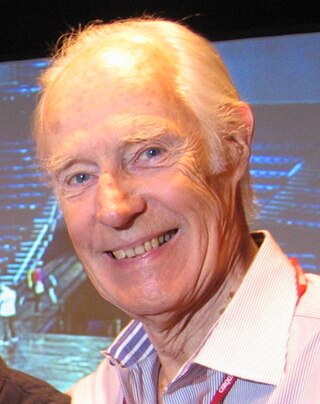
Sir George Henry Martin was an English record producer, arranger, composer, conductor, and musician. He was commonly referred to as the "fifth Beatle" because of his extensive involvement in each of the Beatles' original albums. Martin's formal musical expertise and interest in novel recording practices facilitated the group's rudimentary musical education and desire for new musical sounds to record. Most of their orchestral and string arrangements were written by Martin, and he played piano or keyboards on a number of their records. Their collaborations resulted in popular, highly acclaimed records with innovative sounds, such as the 1967 album Sgt. Pepper's Lonely Hearts Club Band—the first rock album to win a Grammy Award for Album of the Year.

Anthony James "Lonnie" Donegan was a British skiffle singer, songwriter and musician, referred to as the "King of Skiffle", who influenced 1960s British pop and rock musicians. Born in Scotland and brought up in England, Donegan began his career in the British trad jazz revival but transitioned to skiffle in the mid-1950s, rising to prominence with a hit recording of the American folk song "Rock Island Line" which helped spur the broader UK skiffle movement.

Mott the Hoople were a British rock band formed in Hereford, Herefordshire in 1969. Originally named the Doc Thomas Group, the band changed their name after signing with Island Records in 1969. The band released albums at the beginning of the 1970s but failed to find any success. On the verge of breaking up, the band were encouraged by David Bowie to stay together. Bowie wrote their glam-style signature song "All the Young Dudes" for them, which became their first hit in 1972. Bowie subsequently produced their album of the same name, which added to their success.
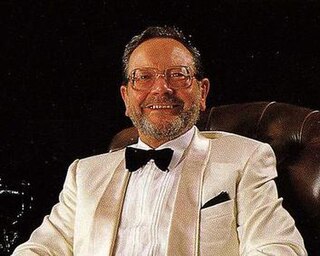
Ronald Alfred Goodwin was an English composer and conductor known for his film music. He scored over 70 films in a career lasting over fifty years. His most famous works included Where Eagles Dare, Battle of Britain, 633 Squadron, Margaret Rutherford's Miss Marple films, and Frenzy.

Gerry and the Pacemakers were an English beat group prominent in the 1960s Merseybeat scene. In common with the Beatles, they came from Liverpool, were managed by Brian Epstein and recorded by George Martin. Their early successes helped make popular the Merseybeat sound and launch the wider British beat boom of the mid-1960s.
The Action were an English band of the 1960s, formed as the Boys in August 1963, in Kentish Town, North West London. They were part of the mod subculture, and played soul music-influenced pop music.

The Hollies are an English rock and pop band formed in 1962. One of the leading British groups of the 1960s and into the mid-1970s, they are known for their distinctive three-part vocal harmony style. Singer Allan Clarke and rhythm guitarist/singer Graham Nash founded the band as a Merseybeat-type group in Manchester, although some of the band members came from towns further north, in east Lancashire. Nash left the group in 1968 to co-form Crosby, Stills & Nash, though he has reunited with the Hollies on occasion. As well as Clarke and Nash other members have included lead guitarist Tony Hicks, rhythm guitarist Terry Sylvester, bassists Eric Haydock and Bernie Calvert, and drummers Don Rathbone and Bobby Elliott.

"From Me to You" is a song by the English rock band the Beatles that was released in April 1963 as their third single. It was written by John Lennon and Paul McCartney. The song was the Beatles' first number 1 hit on what became the official UK singles chart but the second, after "Please Please Me", on most of the other singles charts published in the UK at the time. "From Me to You" failed to make an impact in the United States at the time of its initial release. Instead, a 1963 cover version released by Del Shannon resulted in the song's becoming the first Lennon–McCartney track to enter the US pop charts. The Beatles' original was re-released in the US in January 1964 as the B-side to "Please Please Me", and reached number 41.

The Searchers are an English Merseybeat group who flourished during the British Invasion of the 1960s. The band's hits include a remake of the Drifters' 1961 hit, "Sweets for My Sweet"; "Sugar and Spice" ; remakes of Jackie DeShannon's "Needles and Pins" and "When You Walk in the Room"; a cover of the Orlons' "Don't Throw Your Love Away"; and a cover of the Clovers' "Love Potion No. 9". With the Swinging Blue Jeans, the Searchers tied for being the second group from Liverpool, after the Beatles, to have a hit in the US when their "Needles and Pins" and the Swinging Blue Jeans' "Hippy Hippy Shake" both reached the Hot 100 on 7 March 1964.
Sheldon Talmy is an American record producer, songwriter and arranger, best known for his work in the 1960s with the Who, the Kinks and many other artists.
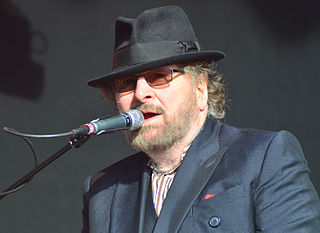
Charles Nicholas Hodges was an English musician and singer who was the lead vocalist of musical duo Chas & Dave.
The Vernons Girls were an English musical ensemble of female vocalists. They were formed at the Vernons football pools company in the 1950s in Liverpool, settling down to a sixteen strong choir and recording an album of standards.
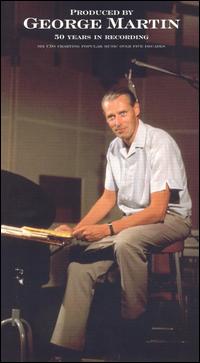
Produced by George Martin is a 2001 various artists compilation box set of tracks produced by Sir George Martin. It is also the title of a documentary film on George Martin co-produced by the BBC's Arena team and released in 2012 by Eagle Rock Entertainment on DVD and Blu-ray.
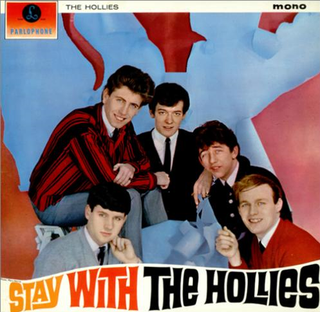
Stay with the Hollies, also known by its American release title Here I Go Again, is the debut album by the British rock band the Hollies and was released in January 1964 on Parlophone Records. In Canada, it was released on Capitol in July 1964, with a different track listing. In the US, Imperial Records issued the album under the title Here I Go Again in June 1964 to capitalize on the moderate success of the singles "Here I Go Again" and "Just One Look". It also features covers of well-known R&B songs, not unusual for Beat groups of the day.
The Roulettes were a British rock and roll and beat group formed in London in 1961. They were recruited to play as the backing group to singer Adam Faith the following year, and continued to perform and record until the late 1960s.
Cliff Bennett and the Rebel Rousers were a 1960s British rhythm and blues, soul and beat group who had two top 10 hits with "One Way Love" and "Got to Get You into My Life".

The Echoes were an English musical group, established in London in early 1960 by singer Chris Wayne, for the Johnny Preston, Conway Twitty and Freddy Cannon tour of Great Britain. During the period 1960 to 1971, the Echoes toured extensively throughout the United Kingdom and elsewhere in the world, playing for various artists and providing the backing on many recordings.
The Luvvers were a Scottish rock group. They are best known as the backing group to Lulu on her debut chart single, "Shout" (1964). They subsequently had a low-key career of their own before disbanding in March 1966.















